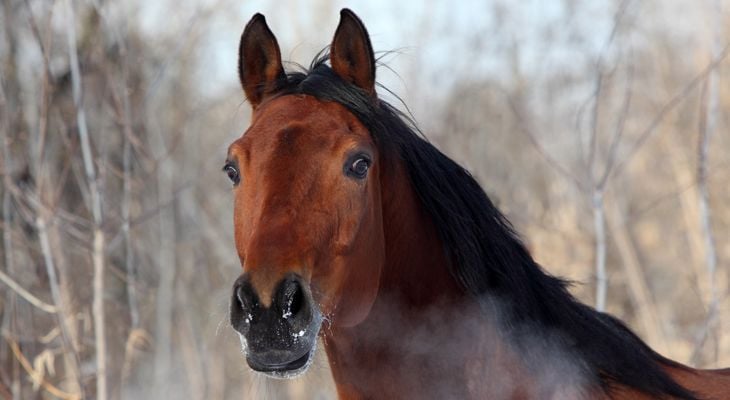
Horses are highly susceptible to a wide variety of respiratory conditions. These can be bacterial, viral or mechanical in nature, or they may be caused by allergies. Some are temporary; others are chronic. Some are serious while others are less serious. Upper airway problems are usually mechanical while infection usually causes disorders of the lower airways. Here are a few of the common respiratory problems that might affect your horse.
Equine Influenza (Flu)
Equine influenza, otherwise known as the flu, affects both the lower and upper respiratory tracts of your horse. It’s very common and extremely infectious. Symptoms include hacking cough, fever, tender lymph nodes, colorless discharge from the eyes or nostrils, depression and loss of appetite. Your horse can be contagious for up to 10 days. The virus spreads though tiny particles that are released when a horse coughs. Traveling horses are at higher risk, because they’re constantly exposed to new horses. Your equine veterinarian will probably prescribe rest and NSAIDs (non-steroidal anti-inflammatory drugs) if a high fever accompanies the flu.
Recurrent Airway Obstruction (Heaves)
This condition has a lot of names. It was formerly called chronic obstructive pulmonary disease (COPD), but is now known as recurrent airway obstruction (RAO) to differentiate it from COPD in humans. Its informal names are “heaves” and “broken wind.”
Whatever you call it, moldy, dusty feeds contribute to this episodic disease. Confinement in a stable, poor ventilation and pollen can also trigger RAO. Symptoms include nasal discharge, depression, inability to exercise, heightened abdominal movement, quick and labored breathing and chronic coughing.
Treatment requires changing your horse’s environment and diet. Your vet may also prescribe medicine.
Guttural Pouch Problems
Your horse’s guttural pouches — air chambers in the back of its neck — are prone to a few respiratory problems. The main symptom of guttural pouch empyema, a streptococcus infection, is thick yellowish-white nasal discharge. Treatments consist of flushing the pouches and administering antibiotics.
Foals can get guttural pouch tympany. Affected foals have bulging, chipmunk-like cheeks. The swelling can partially obstruct the foal’s upper airway. This is a mechanical problem of the guttural pouch, which requires surgery.
A fungal infection causes guttural pouch mycosis. This condition correlates with immune-suppressed horses and those using antibiotics for long periods of time.
Laryngeal Hemiplegia
This one-sided paralysis of the larynx causes a roaring noise. Airflow in the upper airway may be severely restricted, causing your horse to tire easily during exercise. Your vet may suggest one of several surgical options, depending on the severity of the laryngeal hemiplegia.
Epiglottic Entrapment
The epiglottis is a loose flap of cartilage by the root of the tongue. When your horse swallows, the epiglottis covers its windpipe. But if the epiglottis slips, it can become trapped and unable to move when swallowing. Thus, it is unavailable to protect the windpipe. Symptoms include poor performance, noisy breathing and coughing while exercising.
Displaced Soft Palate
The horse’s soft palate is designed to stay flat on the pharynx floor, under the epiglottis, except when your horse swallows. However, it can occasionally flip over the epiglottis and partially block the horse’s nasal passages.
Bronchitis and Pneumonia
A bacterial or viral infection causes bronchitis. Symptoms include phlegm, coughing, depression, lost appetite, difficult and / or noisy breathing and fever. Insufficiently treated, bronchitis can progress to pneumonia, a much more serious condition.
Symptoms of pneumonia include exhaustion, weakness, shivering, sweating and increased respiratory and heart rate. Blood tests will reveal an abnormally high level of white blood cells. Your equine veterinarian will assess the case and decide on the right type of antibiotics and other medications. Minor drainage surgery may be necessary.
Exercise-Induced Pulmonary Hemorrhage (EIPH)
Racehorses and other hard-charging horses are very susceptible to EIPH. With this condition, blood enters the horse’s airways. This is even more apparent in a small percentage of horses, who experience epistaxis, or bleeding from the nostrils. An equine veterinarian can diagnose EIPH via a post-exercise endoscopic exam. Horse owners have tried many treatments, including steroids, bronchodilators, rest, diuretics, nasal strips and omega-3 fatty acids. Results vary.
If your horse has nasal discharge, labored breathing, fever or other signs of possible respiratory trouble, call our office today. We can help devise the best course of treatment.

